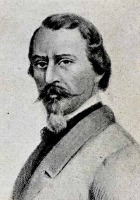Aleardo Aleardi
Aleardo Aleardi Poems
What time in summer, sad with so much light,
The sun beats ceaselessly upon the fields;
The harvesters, as famine urges them,
Draw hitherward in thousands, and they wear
...
In the deep circle of Siddim hast thou seen,
Under the shining skies of Palestine,
The sinister glitter of the Lake of Asphalt?
Those coasts, strewn thick with ashes of damnation,
...
Ere yet upon the unhappy Arctic lands,
In dying autumn, Erebus descends
With the night's thousand hours, along the verge
Of the horizon, like a fugitive,
...
Aleardo Aleardi Biography
Aleardo Aleardi (November 14, 1812 – July 17, 1878), born Gaetano Maria, was an Italian poet who belonged to the so-called Neo-romanticists. Biography Aleardo was born in Verona in 1812, and took an active part in the movement of the Risorgimento. In 1848 he went to Paris, invited by Manin, to garner support for the Venetian Republic. He was arrested twice: at Mantova in 1852 and at Josephstadt in Bohemia in 1859. He then worked as deputy, senator, and finally as professor of aesthetics at Florence, where he died in 1878. Aleardo Aleardi - whose name was Gaetano Maria, then he turned into Aleardo - was born in Verona in 1812 by Maria Channels and Count Giorgio Aleardi. After studying law at the University of Padua together with friends John Meadows and Arnaldo Fusinato, he returned to Verona, interest in poetry and art criticism. Among his earliest compositions there are Marriage (1842), an exaltation of marriage as an expression of civilization, and the Arnalda Roca, in 1844, a poem that has historical protagonist a young woman who dies defending his honor: there is already in it the search for scenic effects and dramatic color that is typical of the entire production next dell'Aleardi. The first success was achieved in 1846 with the two Letters to Mary, in verse, in which the poet turns to friend proposing a platonic love: it is an opportunity to express his belief in the immortality of the soul and pour out his emotional suffering in a spirit of romanticism way. Frequent visitor to the salon of Countess Anna Serego Gozzadini Alighieri, he courted the daughter Nina, dedicating numerous poems. The riots of 1848, was sent to Paris by Manin to ask for help reconstituted Venetian Republic. He was arrested in 1852 and imprisoned for several months in the fortress of Mantua was followed by a period of depression and, in 1855, the idyll Raphael and the Fornarina, where the affectation of the poem is likely to reach the poor taste. Often compared to the Meadows for the common languor sentimental, but to the subject, the luck dell'Aleardi declined at the end of the nineteenth century to get some recognition from the Cross, which he took over the sincerity of the poet in the forms of dubious taste and made him a precursor the pastures, and De Lollis, who saw in him the romantic poet of transition, torn between classicism and realism. While negative were the judgments of Momigliano, for whom "in his poetry is almost always aleardismo, almost never Aleardi ', and Pompeati evaluating the Aleardi" a chrysalis of a poet ", located in the Flora him as a genuine poet and Sapegno, confirming the quality of poetic dell'Aleardi, alleges that his lapses of taste to the cultural climate of the time. For the Piromalli, on the basis of studies Gramsci, the fear of the Paris revolution of 1848 and the failure of the Italian revolution in 1849 "to propel the late Romantic literature Arcadia of sentimentality and a longing for steamy atmospheres," in which the poet "becomes an exceptional character for his sensitivity and higher than the practical and economic realities" and the poem a vague idealism, according to a "costume sleepy, sluggish and autonobilitantesi." The Aleardi it is, with the Prati, one of the main representatives: they are both "poets consumption, ideal anticontadini, in love with the beauty of the heart, unable to leave the floral language and go to the concrete". Poetry His poetic work is not extensive, and mostly revolves around the themes of history and the fatherland. He was in fact called the poet of history because of his tendency to research and relive the past, also the distant past of prehistory and the mythical infancy of the earth (Il monte Circello (Circello mountain), 1856 and Le prime storie (The first stories), 1857). However, one often finds that this nostalgia is, more often than not, a pretext to display his eloquence.)
The Best Poem Of Aleardo Aleardi
The Harvesters
What time in summer, sad with so much light,
The sun beats ceaselessly upon the fields;
The harvesters, as famine urges them,
Draw hitherward in thousands, and they wear
The look of those that dolorously go
In exile, and already their brown eyes
Are heavy with the poison of the air.
Here never note of amorous bird consoles
Their drooping hearts; here never the gay songs
Of their Abruzzi sound to gladden these
Pathetic hands. But taciturn they toil,
Reaping the harvests for their unknowrn lords;
And when the weary labor is performed,
Taciturn they retire; and not till then
Their bagpipes crown the joys of the return,
Swelling the heart with their familiar strain.
Alas! not all return, for there is one
That dying in the furrow sits, and seeks
With his last look some faithful kinsman out,
To give his life's wage, that he carry it
Unto his trembling mother, with the last
Words of her son that comes no more. And dying,
Deserted and alone, far off he hears
His comrades going, with their pipes in time,
Joyfully measuring their homeward steps.
And when in after years an orphan comes
To reap the harvest here, and feels his blade
Go quivering through the swaths of falling grain,
He weeps and thinks- haply these heavy stalks
Ripened on his unburied father's bones.
